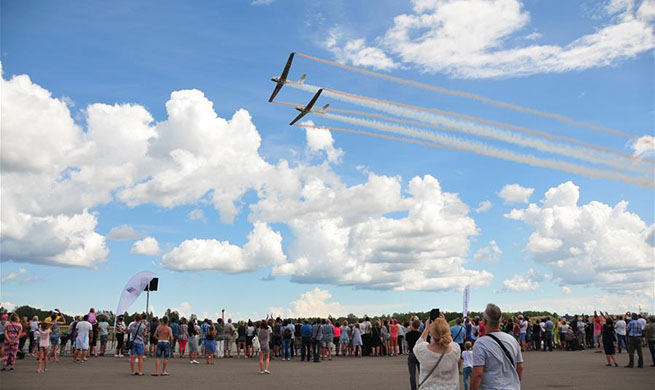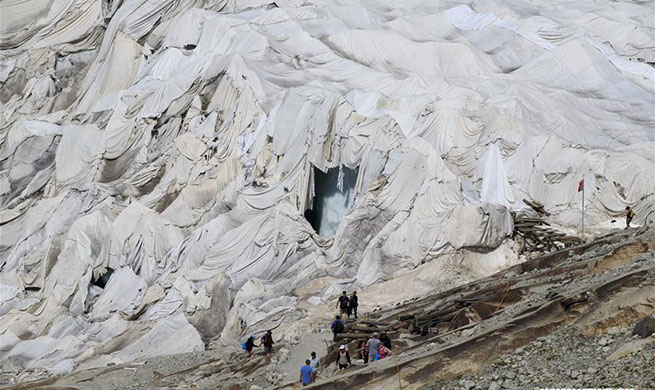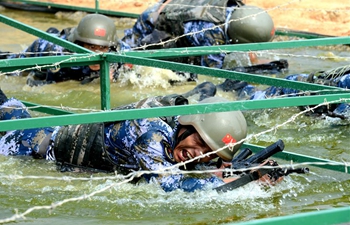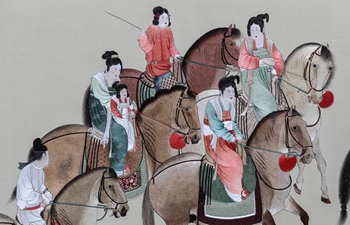DAMASCUS, Aug. 5 (Xinhua) -- The summit between the leaders of the United States and Russia in Finland's Helsinki last month has started to pay off in Syria on several levels, as a consensus between major players is deemed necessary to end the Syrian war, analysts said.
At the summit which took place on July 16, Russian President Vladimir Putin and his U.S. counterpart Donald Trump agreed on the need to resolve the situation in southern Syria.
Putin stressed the need to return the situation in southern Syrian near the Israeli-occupied Golan Heights to the way it was ahead of the war that has lasted for more than seven years in Syria.
Putin highlighted the need to defeat terrorists in southwestern Syria while keeping the forces of Syria and Israel separated.
He referred specifically to the agreement signed in 1974, which officially ended the 1973 Arab-Israeli war and designated the lines of separation between Israel and Syria.
On July 19, just a day after the summit, the state media outlets in Syria said the rebels in Quneitra province in southern Syria near the Israeli-occupied Golan Heights accepted to evacuate and surrender their heavy weapons to the Syrian army.
Those who want to reconcile with the government remained in their areas to embark on a reconciliation process.
The evacuation process is ongoing and the Syrian army has restored large swathes of territories in Quneitra, including the crossing with the Golan Heights.
On Aug. 2, a war monitor group said the United Nations Disengagement Observer Force (UNDOF) returned to its positions on the line of separation between Syria and the Israeli-occupied territories in the Golan Heights after leaving it in 2014.
The Syrian Observatory for Human Rights said Russian military police and the Syrian forces have been deployed in Quneitra and in the disengagement zone after the entire province of Quneitra returned under the government's control.
The UNDOF halted its operations in southern Syria in 2014 after the ultra-radical groups abducted UN peacekeepers in that area.
The UNDOF forces were first deployed between Syria and the Golan Heights in 1974 to separate Syrian and Israeli forces after Israel occupied the Golan Heights during the 1967 war.
In Syria, analysts have always highlighted the need for a consensus between superpowers to help bring an end to the long-standing conflict in the war-torn country.
Additionally, the progress of the Syrian army since starting the "battle of the south" on June 19 has also been conducive in pushing the United States and Israel to accept the fact that the Syrian army is gaining the upper hand and that they need to act accordingly.
Osama Danura, a Syrian political expert, told Xinhua that regarding the Syrian crisis, Putin came to the summit from a stance of power after victories of the Syrian army, adding that those victories have been crowned with Russian diplomatic success in containing the regional and international players in the Syrian war.
The analyst said the Russian-U.S. summit marked a new stage of the understanding between both powers regarding the Syrian crisis in terms of finding a political solution now that the Syrian government is more stable and in control.
The positive development has stopped on the situation in southern Syria, but also in northeastern Syria.
Days after the summit, a delegation of the Kurdish-led Syrian Democratic Council (SDC) was invited to the Syrian capital Damascus for talks about the situation in predominantly-Kurdish areas in northeastern Syria.
Later on, the SDC, the political wing of the U.S.-backed Syrian Democratic Forces (SDF), declared that an agreement has been reached with Damascus "to draw a roadmap that would lead to a democratic, decentralized Syria."
The meeting marked the recent will of Kurdish-led groups, who control roughly one quarter of Syria, to open channels with the administration of Syrian President Bashar al-Assad to reach a political formula for the situation in northern Syria and possibly to preserve their autonomy amid reports that the SDF could hand over some of its positions to the Syrian army.
Ilham Ahmed, executive head of the Syrian Democratic Council (SDC), said in a recent interview that further discussions will be held with the government, noting that first round of talks touched upon generalities.
Mahmoud Meri, another expert, told Xinhua that there seems to be an understanding between Moscow and Washington that the Assad administration should regain control over all of Syria.
He said the example in southern Syria is one of the signs, noting that rebel-held areas in northern Syria will follow their lead.
Maher Ihsan, a Syrian journalist and a political expert, said the Russians have succeeded since entering the actual course of the Syrian crisis in 2015 to prove themselves as reliable negotiators and guarantors.
All of the deals that have been reached with the rebels were spearheaded by the Russians, and their presence in Syria is achieving a sort of balance and a bridge between the Syrian government and the powers that were antagonists to the Assad government, he said.
"The Russian-backed Syrian army has succeeded in restoring large swathes of territories across the country and that has shattered any foreign betting on the rebel groups, which have been falling one by one," Ihsan said.
"When the West sensed that the rebels they were backing have largely failed, they come to realize the need to secure interests through negotiating with Russia, but this time Russia is negotiating from a stronger stance due to the victories on the ground," he added.
This is why the recent Trump-Putin summit was positive in terms of the actual results on the ground and in light of the U.S. desire to withdraw forces from Syria while maintaining its interests in the Kurdish-controlled areas in northern Syria, which explains the Kurdish growing desire to talk and agree with Damascus, he noted.

















